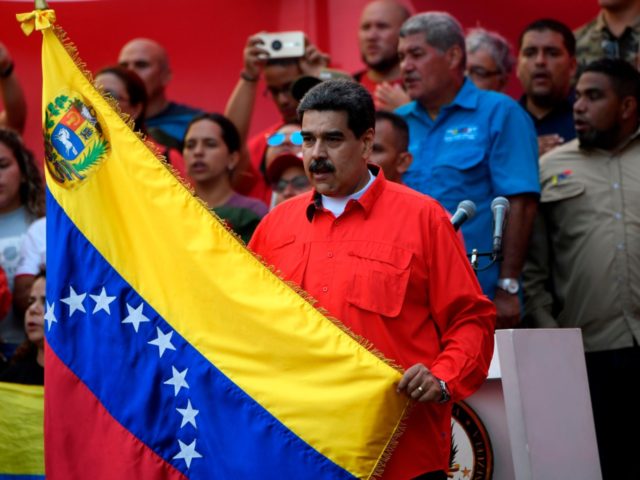An overwhelming majority of Venezuelans would support a foreign military intervention to oust socialist dictator Nicolás Maduro and believe that the rogue regimes in Russia and Cuba have colonized their country, the national polling firm Meganálisis found in a survey published Monday.
Asked if the federal legislature, the National Assembly, should authorize foreign military missions in the country, 89.5 percent of Venezuelans said yes. Another 91.2 percent said they did not believe it was possible for Venezuelans to remove Maduro without foreign military intervention. About 88 percent said they did not trust the nation’s armed forces.
The demand for foreign intervention appears to be tied to the fact that Venezuelans believe their country is already under foreign control. Nearly nine out of ten people (87.9 percent) said that they agreed with the statement “Venezuela has been intervened and controlled by Cuba and Russia.” Those two nations are Maduro’s closest allies; Maduro’s Foreign Minister Jorge Arreaza traveled to Moscow this weekend and stated that the regime is contemplating asking Russia to send more troops into the country to help repress protesters.
Venezuelans, at 87.6 percent, also rejected the concept of another “dialogue” between Guaidó’s political faction and Maduro. Guaidó’s socialist Popular Will party joined a coalition of opposition parties called the Democratic Unity Roundtable (MUD) in 2014 that engaged in talks with the Maduro regime for years. Maduro used the opportunity to send the Bolivarian National Guard (GNB) out to kill and arbitrarily arrest peaceful protesters. Venezuela today boasts 273 political prisoners as of May 3, according to human rights groups on the ground.
Meganalisis executed the poll between May 2 and 4, in the immediate aftermath of Guaidó announcing a military uprising to finally oust Maduro. Guaidó was sworn in as president in January after Maduro’s last presidential term lapsed, but Maduro refused to leave the presidential palace and still retains control of the nation’s military through his top officers. On April 30, Guaidó appeared at an airbase at dawn announcing that those senior officers had agreed to remove Maduro and that the military would need civilians to take the streets to help them remove the final vestiges of the socialist regime. That never materialized, however, and Maduro’s soldiers launched a campaign of repression in response that has killed five people so far. The youngest victim was 14 years old.
The poll found that Venezuelans are confused as to who their president is. While about half (49.8 percent) accept President Juan Guaidó as the legitimate head of state, another 35.4 percent of people said they “do not know” who the president of Venezuela is. Less than 5 percent recognize Maduro as president. Guaidó’s support has fallen since April 1, when Meganalisis’ monthly poll found that 54.9 percent of Venezuelans recognized Guaidó as their president, but so has Maduro’s, as 6.6 of Venezuelans accepted his legitimacy last month. The biggest increase was in the “don’t know” category, which saw a nearly 10-percent rise.
Meganalisis surveyed 1,120 people for their results, targeting the 16 most populous states and a sampling of 32 cities nationwide.
Ambivalence about Guaidó appears tied to the rejection of dialogue with Maduro, as Popular Will and its leader, Leopoldo López, were key figures in making talks happen, even though López was a political prisoner at the time. The results of April’s survey indicate also that Venezuelans are tired of socialism and may be wary of Popular Will because it is a formal member of the Socialist International. In that survey, pollsters asked respondents if they agreed with the statement “socialism is the worst and most destructive political ideology to lead the government.” Again, nearly 90 percent – 87.9 percent – said yes.
Guaidó has insisted that he has support within the military and will be able to take control of it soon. After the week passed without a significant uprising in the armed forces, however, Guaidó said in an interview with the BBC that he is considering asking the United States for military support.
“I, as the president in charge of the national parliament, will evaluate all options if necessary,” he said.
Striking a more defeated tone this week, Guaidó lamented to Agence France-Presse (AFP) Monday that his uprising did no go as planned because “there were people who did not do their part.”
“It doesn’t mean they won’t do so soon. We are expecting that many more fulfill their duty to the country. As is now obvious, the discontent that exists is universal and the Armed Forces cannot escape it,” he contended.
Unlike Russia – which has unapologetically parked special forces in the country – the United States has no known troops presence in the nation. President Donald Trump has refused to rule out sending troops into Venezuela if necessary to stop the bloodshed, the product of Maduro urging both soldiers and unofficial socialist gangs to kidnap, torture, and kill unarmed dissidents.
Russia’s foreign minister, Sergei Lavrov, called the potential presence of U.S. troops in the country “catastrophic and unjustified” this week. “We are categorically against military intervention. The use of force can only be authorized by the U.N. Security Council, or used in response to aggression by a sovereign state,” he argued. Lavrov did not remark on the legality of Russia’s military intervention on behalf of Maduro.

COMMENTS
Please let us know if you're having issues with commenting.